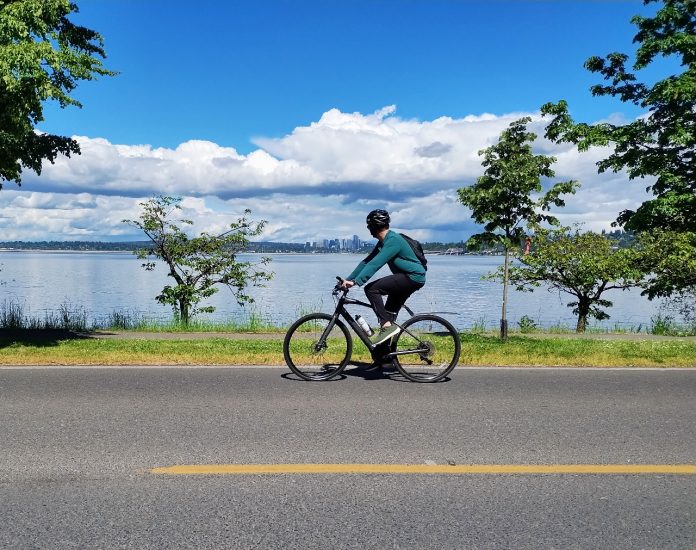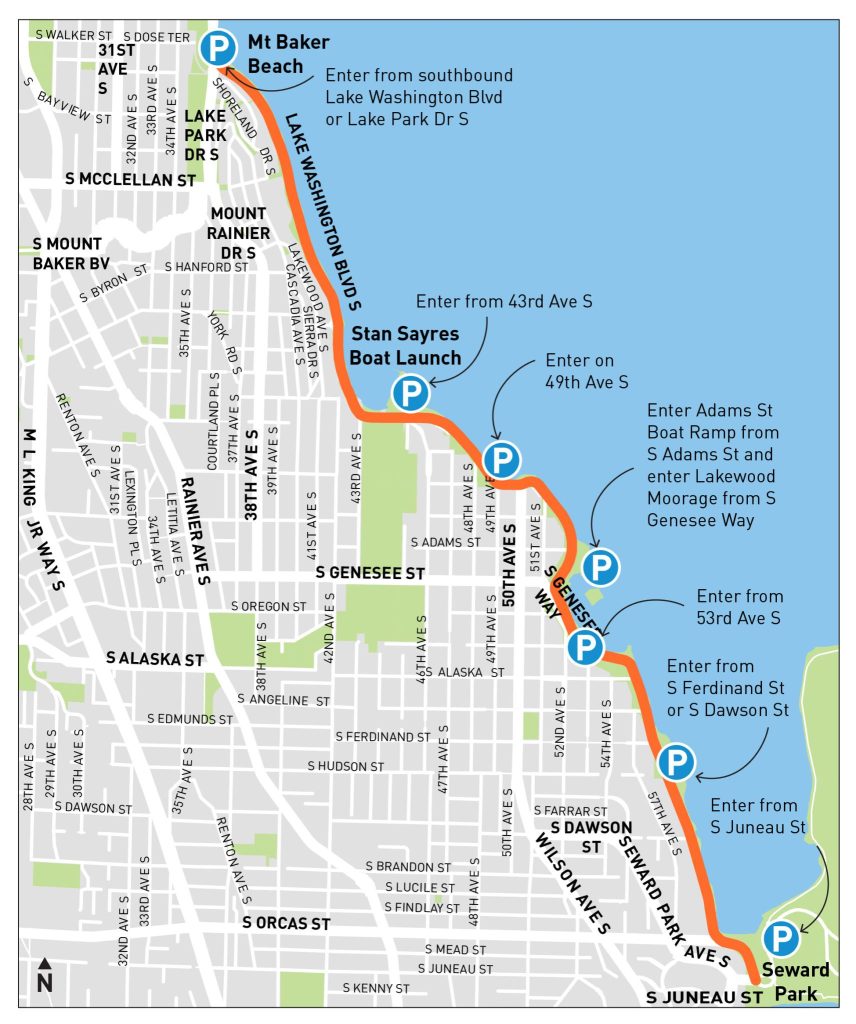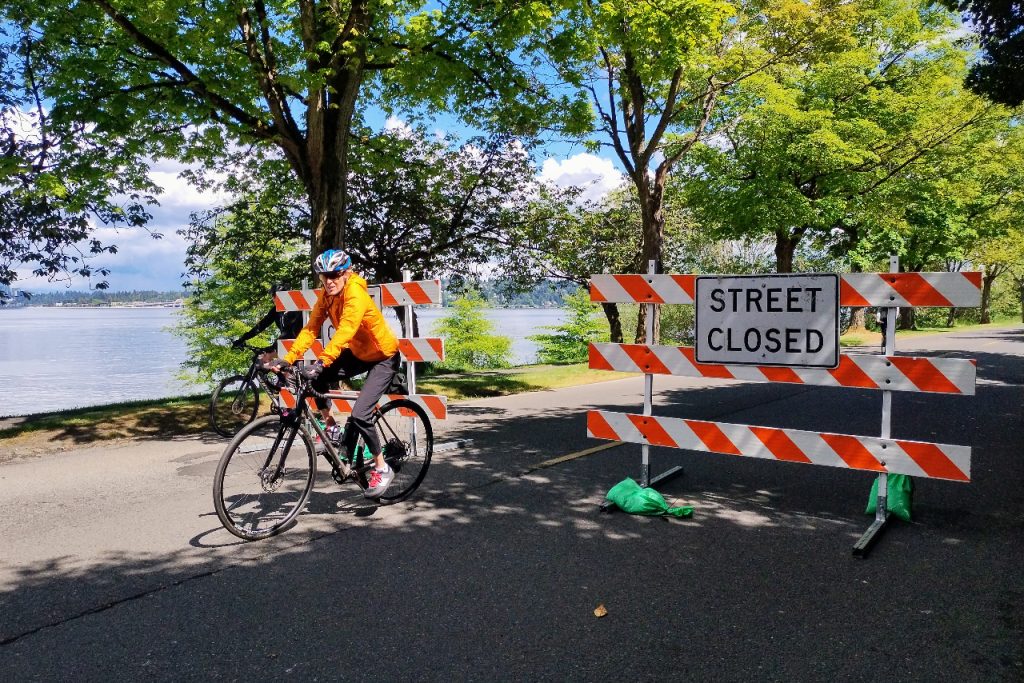
A “brokered compromise” orchestrated by Mayor Bruce Harrell’s office was the impetus behind a quick scaling-back of planned hours at Seattle’s only major annual open streets event, email records reveal. Seattle Parks and Recreation employees created an expanded schedule they were ready to implement this summer. However, after that schedule’s public release, communications staff in the department quickly scrambled to replace it with a pared-back version that was in alignment with the Mayor’s Office expectations.
Emails obtained by The Urbanist in a public records request undermine the initial claim by the City that the original schedule was a simple communications error.
On May 1, Seattle Parks announced the 2024 schedule for Bicycle Weekends, the annual weekend closures of Lake Washington Boulevard to car traffic between Mount Baker Beach and Seward Park. Fans of the event were excited to see that its hours had been expanded to allow more access than a more abridged schedule last year.
In 2023, the 10 weekend closures were shortened to just 32 hours each, down from 60 hours, with an additional 24 hours provided on holiday weekends. Seattle residents and visitors wanting to enjoy a sunset on a car-free Lake Washington Boulevard only had one chance per weekend to get down to the lake, and the boulevard was reopened to car traffic even on Monday holidays.

But within a few hours, the 2024 schedule was retracted and replaced with the more restrictive schedule from 2023 that included no Friday nights, no early Monday mornings, and no holiday Mondays. This attracted widespread attention, but Seattle Parks spokesperson Rachel Schulkin portrayed this as a simple clerical mistake.
“Just an error, our intent was to use the schedule from last summer,” Schulkin wrote to The Urbanist on May 2. “Somehow we put in the wrong dates, but corrected as soon as we saw.”

But emails reveal that Seattle Parks staff had proposed the initial schedule internally, deemed it ready to implement, and formulated a direct justification for adding more hours to Bicycle Weekends as the schedule moved up the chain of approval. The expanded schedule provided “padding for several co[-]occuring events permitted for [Lake Washington Boulevard] early Saturday morning,” according to an email sent by Seattle Parks crew chief Brian Willis.
Willis also referenced the fact that reopening Lake Washington Boulevard before morning commuting hours on Mondays had been a primary justification for scaling back Bicycle Weekend hours, but noted that Seattle Parks was set to accommodate that through communication with its vendor while still keeping the extended hours.
“Sun[day] after 7 was padding to make sure roads are open for the Mon[day] commute,” Willis wrote. “However, I’ve reinforced that necessity with Barricade and they will open on Monday mornings.”
It’s clear from the emails that a reversion to the 2022 schedule was moving forward on the ground. After the new schedule was sent out, it was Communications Manager Rachel Schulkin who contacted Adiam Emery, the executive general manager in Bruce Harrell’s office and point person on transportation and parks issues, to take the fall for the “mistake.”
“No problem,” Emery wrote back. “Thank you, Rachel, for making the edits quickly. There has been an extensive outreach effort that landed us on the operational schedule that was agreed upon last year.”
Mayor Harrell lives in Seward Park a couple blocks off of Lake Washington Boulevard and has kept the issue of modifying the street at arm’s length, despite the success his predecessor had in expanding pedestrianization efforts. Mayor Jenny Durkan extended the open street for much of the summer of 2020 (including weekdays) to aid in pandemic response and physical distancing measures.
The day after the 2024 schedule announcement, Mike Schwindeller, a Seattle Parks capital projects manager, emailed the department team handling Lake Washington Boulevard to ask who had made the call to revert to the 2022 schedule. That email brings even more clarify to Emery’s remarks.
“I was surprised that we changed from what we did in 2023,” Schwindeller wrote. “While I personally don’t like it (and think it doesn’t make sense), that was the compromise that we brokered with the Mayor’s office in 2023 instead of going back to Sunday only, (which was on the table).”
Survey after survey shows a desire to increase the frequencies of Lake Washington Boulevard open streets events, with 79% of respondents in a 2022 SDOT survey saying that they though Bicycle Weekends should either stay in place or expand, with the vast majority (62%) wanting the program to expand to additional weekends and holidays.

As interest surged in improving Lake Washington Boulevard, the Seattle Department of Transportation (SDOT) formed a community taskforce to look at both short and long term changes that could be made to the roadway, which is actually on Parks property but is maintained by SDOT. While the group reached an impasse on the question of reallocating street space along the street permanently, they did come to agreement on things like the need for additional benches along the street, more traffic calming measures, and improvements to the narrow walking and rolling path along the street.
The taskforce also came to a consensus on the need for a “consistent and predictable” schedule for Bicycle Weekends, though that clearly means different things for different people. The group Coexist Lake Washington, which calls itself the “only group in South Seattle making sure that the voices of drivers are included in this process,” has called for Bicycle Weekends to go back to Sundays only.
While it’s still not fully clear who the “compromise” around Bicycle Weekends was actually brokered with, it is clear that the Mayor Bruce Harrell’s office played a central role in making sure that access to Seattle’s only major open streets event stayed limited for another year.
Ryan Packer has been writing for The Urbanist since 2015, and currently reports full-time as Contributing Editor. Their beats are transportation, land use, public space, traffic safety, and obscure community meetings. Packer has also reported for other regional outlets including BikePortland, Seattle Met, and PubliCola. They live in the Capitol Hill neighborhood of Seattle.

